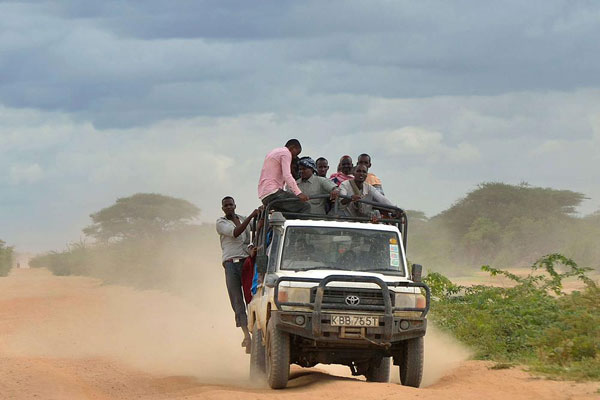Repatriation of Somali refugees to resume next week

 The repatriation of Somali refugees from Kenya will resume next week.
The repatriation of Somali refugees from Kenya will resume next week.
The exercise was halted due to heavy rains that affected the roads, according to Commissioner for Refugee Affairs Mr Haron Komen. So far 2050 Somali refugees who were residing in Dadaab Camp had been repatriated up to early last month when the exercise was suspended.
The Commissioner for Refugee Affairs said Friday the numbers of refugees to be repatriated will be increased when the exercise resumes next week.
Up to 200 persons will be targeted per convoy in a bid to ensure that as many refugees as possible are returned to their country.
The repatriation is being done through a framework agreed upon in a tripartite agreement between Kenya, Somalia and the United Nations.
Mr Komen who gave a briefing on the repatriation exercise at the Department headquarters in Lavington Friday said it will be important for the Somali refugees to come out in large numbers so that they can be assisted to go back home.
He said refugees from Baidoa, Luug and Kismayo should especially be more than willing to return home as the areas have been liberated by Amisom and the Somali National Army.
Updated statistics from the Ministry of Interior and Coordination of National Government show the current population of documented refugees is 589,994, a slight increase from 585,363 in 2014. The Ministry attributes the increase to the influx of South Sudanese refugees.
The estimated number of Somali refugees in the country is 423,244.
WASTE OF HUMAN RESOURCE
In a new handbook of the department, outgoing Principal Secretary in the Ministry Dr Monica Juma emphasizes that repatriation is the best and realistic durable solution.
“Keeping the refugees in the camps for 25 years is a waste of the human resource potential they possess. We would be happy to see the refugees return home to participate in rebuilding their lives and their nation,” she says.
She says in the manual on the refugee status in the country that Kenya has been a good host to refugees and even made arrangements for them to attain professional skills through training in local universities and colleges.
However, she says this has ended up putting enormous pressure on the security and physical environment in the country as the number of refugees in the country continues to soar. “It is therefore imperative that refugees whose countries have stabilized return home and participate in nation building,” she states.
Interior and Coordination National Government Cabinet Secretary Joseph Ole Nkaissery says in the manual that low funding of programs for refugees and displaced persons has led to a lower number of refugees volunteering to return to their home countries.
The CS says the repatriation exercise should be expedited under the Tripartite Agreement on voluntary basis so that more refugees can return to their homes.
He says in the manual that for the case of Somalia, many parts of the country have been liberated, secured and stabilized and hence conducive for the returnees.
He suggests creation of settlements, something akin to the Dadaab set-up in Somalia for the returnees and urged the international community to improve the livelihood programs in Somalis to create opportunities for them.
Mr Komen says through the recently launched Integrated Population Registration System, the refugee database will also be linked to the National Registration database and make it easy to manage and avoid duplication and illegal registration of refugees.
Source : Daily Nation